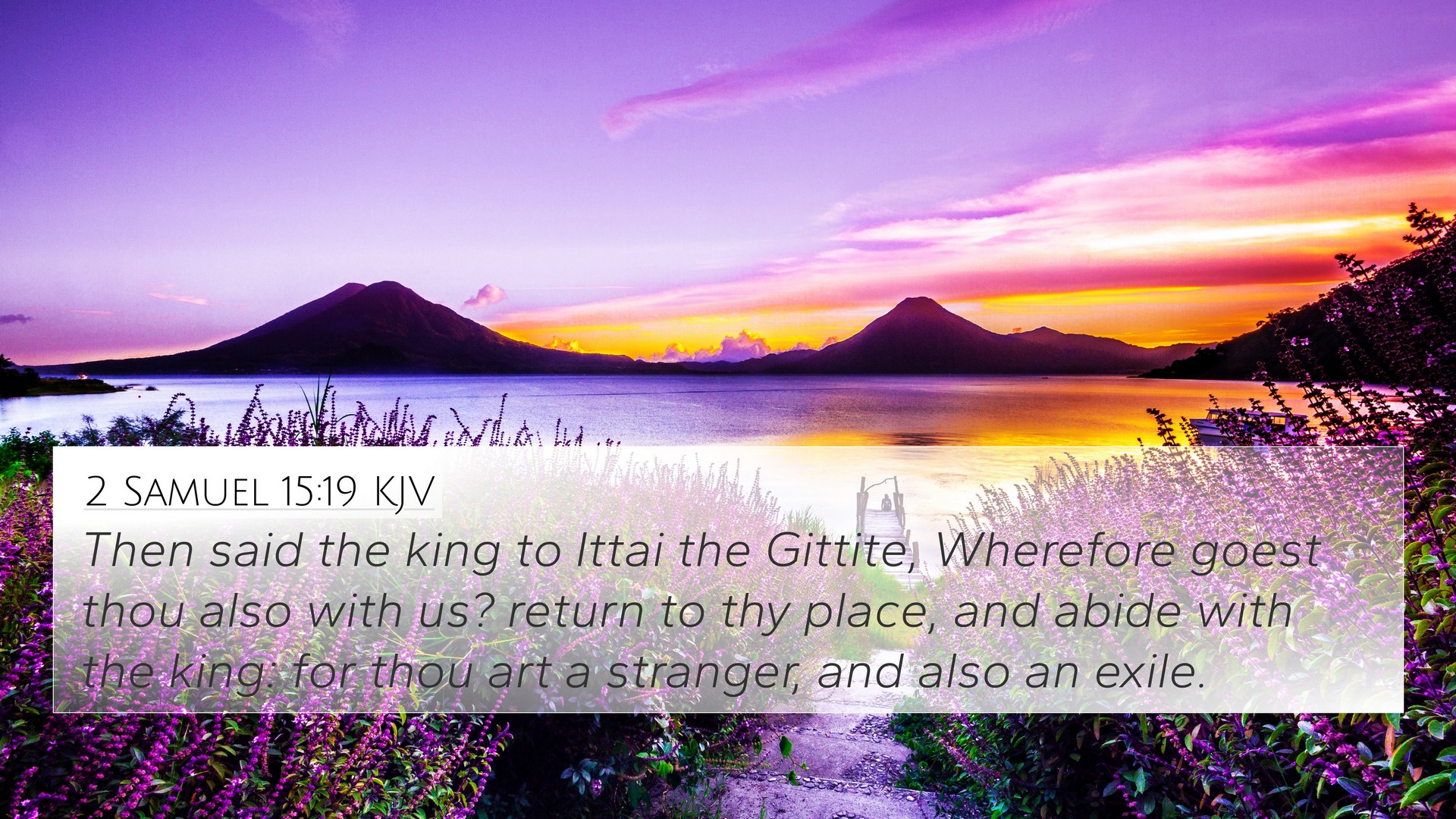Understanding 2 Samuel 15:19
Verse: “But then said the king to Ittai the Gittite, 'Why dost thou go with us? return to thy place, and abide with the king: for thou art a stranger, and also an exile.'”
Context and Background
This passage occurs during a tumultuous time in King David's reign when he is fleeing from his son Absalom, who has staged a coup against him. Ittai the Gittite, a Philistine, had recently joined David and pledged loyalty to him. David's question reveals his concern for Ittai's safety and his status as a foreigner in Israel.
Commentary Insights
-
Matthew Henry's Commentary:
Henry notes that David, as a considerate leader, shows compassion towards Ittai, offering him an opportunity to return rather than face the dangers of conflict. This demonstrates David's humility and acknowledgment of Ittai's foreign status. Henry emphasizes the importance of loyalty and friendship, illustrating that true loyalty persists even amid adversity.
-
Albert Barnes' Notes:
Barnes highlights that David was not only concerned about military loyalty but also about personal well-being. His question to Ittai suggests that he values his life and comfort over mere allegiance. This action teaches us that loyalty to a cause should never overshadow moral considerations for others’ safety and peace.
-
Adam Clarke's Commentary:
Clarke discusses Ittai's status as a Gittite and the implications of being a foreign soldier among David's ranks. He notes that David's invitation to return could also reflect the king's aware strategy to prevent anyone from unnecessary danger. Clarke points out that Ittai's allegiance signifies a deeper commitment beyond nationality, indicating that true service can arise from genuine faith and loyalty, even from those outside the covenant community.
Thematic Connections
This verse showcases several important biblical themes:
- Compassionate Leadership: David's approach to Ittai reflects a leader's duty to care for followers. This is paramount in establishing trust.
- Issues of Identity and Belonging: The dynamic between natives and foreigners is explored here, as Ittai, despite being a foreigner, shows profound loyalty.
- Friendship and Loyalty: The bond between David and Ittai highlights the value of relationships that transcend national and ethnic barriers.
Cross-References
In examining this verse, we can identify several related scriptures:
- 1 Samuel 22:2 - This verse illustrates David’s leadership in surrounding himself with those who seek refuge with him.
- 2 Samuel 19:31-39 - A subsequent discussion about loyalty reflects further on relationships formed during David's reign.
- Psalm 139:19-22 - A connection to David's mindfulness of enemies and the weight of loyalty is relevant in the context of this struggle.
- 1 Chronicles 12:18 - A picture of the loyalty from foreign warriors who supported David's reign.
- Matthew 9:9 - Jesus associations with tax collectors and sinners further builds the theme of inclusive loyalty.
- Romans 10:12 - Paul’s affirmation that both Jews and Gentiles can be united in Christ parallels Ittai's story.
- Galatians 3:28 - Echoes the message of unity beyond cultural distinctions, aligning with themes of loyalty from different backgrounds.
Exegetical Reflection
Through this verse, readers can explore what it means to navigate loyalty in complex situations. It invites contemplation on:
- How do we define our commitments in times of trouble?
- In what ways can we extend compassion to those who may feel like outsiders?
- What can we learn from David about leading with empathy and understanding?
Conclusion
2 Samuel 15:19 is a profound illustration of the dynamic interplay between loyalty, leadership, and the intricacies of personal relationships, set against a backdrop of strife. David’s treatment of Ittai reminds readers to value the tapestry of community made from diverse threads of background and experience. It encourages further study and cross-referencing which enriches the understanding of biblical themes through relationships and historical contexts.




